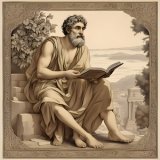The Wolf and the Lean Dog
The Wolf and the Lean Dog is a classic fable by Aesop that points out the inherent dangers of greed and deception. When a hungry wolf encounters a lean dog with a collar, he attempts to tempt the dog to join him in the wild. But when the dog reveals his collar is a result of being leashed and guarded by humans, the wolf realizes the dog's protections come with a price and decides to return to the wild, valuing freedom over protection and excess. This story emphasizes the importance of freedom, self-sufficiency and the value of honest living.
A Wolf prowling near a village one evening met a Dog. It happened to be a very lean and bony Dog, and Master Wolf would have turned up his nose at such meager fare had he not been more hungry than usual. So he began to edge toward the Dog, while the Dog backed away. "Let me remind your lordship," said the Dog, his words interrupted now and then as he dodged a snap of the Wolf's teeth, "how unpleasant it would be to eat me now. Look at my ribs. I am nothing but skin and bone. But let me tell you something in private. In a few days my master will give a wedding feast for his only daughter. You can guess how fine and fat I will grow on the scraps from the table. Then is the time to eat me." The Wolf could not help thinking how nice it would be to have a fine fat Dog to eat instead of the scrawny object before him. So he went away pulling in his belt and promising to return. Some days later the Wolf came back for the promised feast. He found the Dog in his master's yard, and asked him to come out and be eaten. "Sir," said the Dog, with a grin, "I shall be delighted to have you eat me. I'll be out as soon as the porter opens the door." But the "porter" was a huge Dog whom the Wolf knew by painful experience to be very unkind toward wolves. So he decided not to wait and made off as fast as his legs could carry him. Do not depend on the promises of those whose interest it is to deceive you. Take what you can get when you can get it.
Translation
Translate and read this book in other languages:
Select another language:
- - Select -
- 简体中文 (Chinese - Simplified)
- 繁體中文 (Chinese - Traditional)
- Español (Spanish)
- Esperanto (Esperanto)
- 日本語 (Japanese)
- Português (Portuguese)
- Deutsch (German)
- العربية (Arabic)
- Français (French)
- Русский (Russian)
- ಕನ್ನಡ (Kannada)
- 한국어 (Korean)
- עברית (Hebrew)
- Gaeilge (Irish)
- Українська (Ukrainian)
- اردو (Urdu)
- Magyar (Hungarian)
- मानक हिन्दी (Hindi)
- Indonesia (Indonesian)
- Italiano (Italian)
- தமிழ் (Tamil)
- Türkçe (Turkish)
- తెలుగు (Telugu)
- ภาษาไทย (Thai)
- Tiếng Việt (Vietnamese)
- Čeština (Czech)
- Polski (Polish)
- Bahasa Indonesia (Indonesian)
- Românește (Romanian)
- Nederlands (Dutch)
- Ελληνικά (Greek)
- Latinum (Latin)
- Svenska (Swedish)
- Dansk (Danish)
- Suomi (Finnish)
- فارسی (Persian)
- ייִדיש (Yiddish)
- հայերեն (Armenian)
- Norsk (Norwegian)
- English (English)
Citation
Use the citation below to add this book to your bibliography:
Style:MLAChicagoAPA
"The Wolf and the Lean Dog Books." Literature.com. STANDS4 LLC, 2025. Web. 22 Feb. 2025. <https://www.literature.com/book/the_wolf_and_the_lean_dog_2317>.








Discuss this The Wolf and the Lean Dog book with the community:
Report Comment
We're doing our best to make sure our content is useful, accurate and safe.
If by any chance you spot an inappropriate comment while navigating through our website please use this form to let us know, and we'll take care of it shortly.
Attachment
You need to be logged in to favorite.
Log In